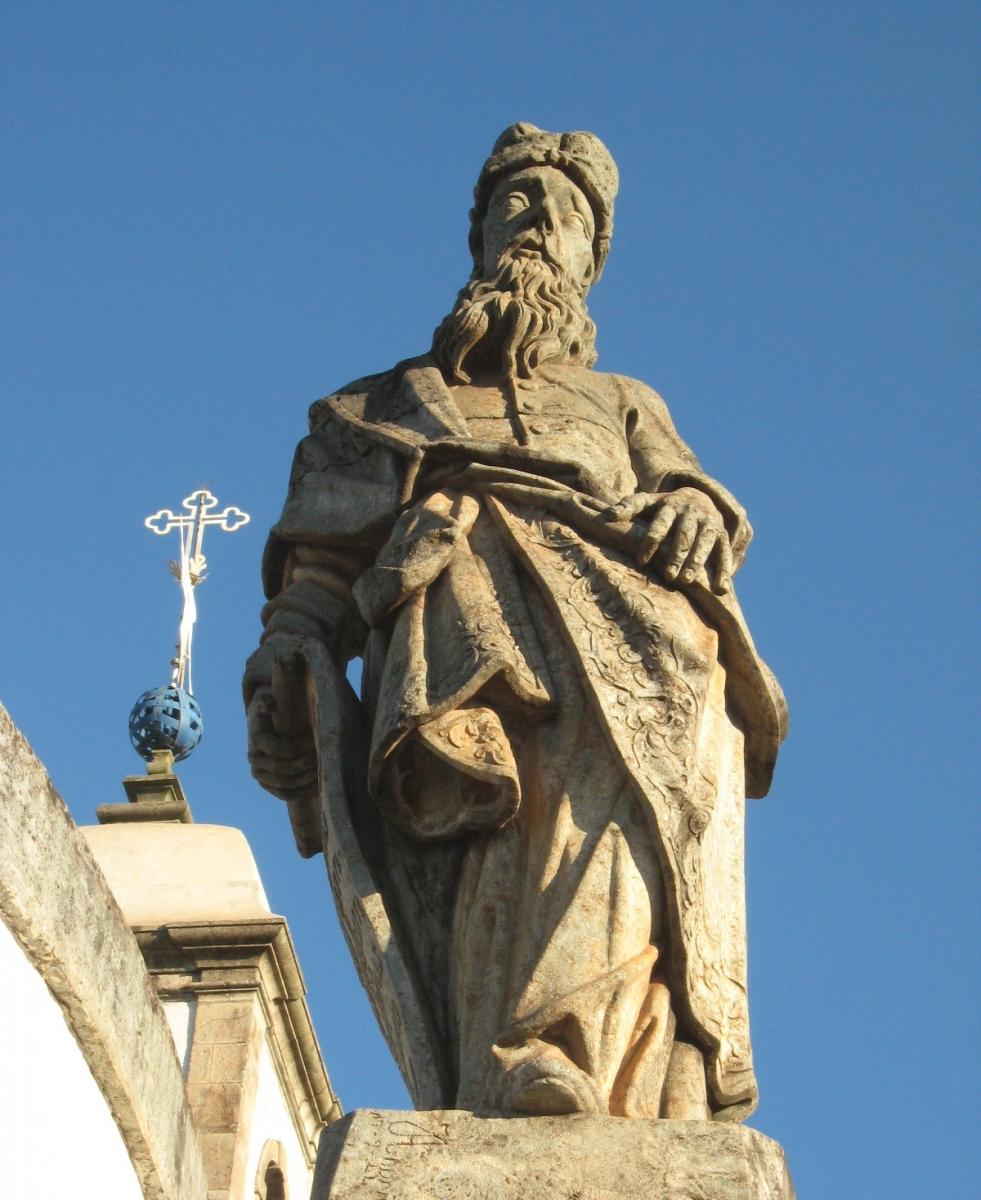What Is in a Name? Lessons from the Names of Old Testament Prophets
Terry B. Ball
Terry B. Ball, "Notes: What Is in a Name? Lessons from the Names of Old Testament Prophets," Religious Educator 15, no. 2 (2014): 147–153.
Terry B. Ball (terry_ball@byu.edu) was a professor of ancient scripture at BYU when this article was published.
 Lyle Beddes, The Prophet Ezekiel, © 1977 Intellectual Reserve, Inc.
Lyle Beddes, The Prophet Ezekiel, © 1977 Intellectual Reserve, Inc.
Over the years, as I have taught the messages of the Old Testament prophets, I have found that many of their names contain answers, information, and perspectives to issues and questions posed in their writings. Helping students see how some prophets’ names can be related to their teachings is one way we can help them understand, appreciate, and remember their messages. Here are some worth considering.
Habakkuk: What Should Be Our Reaction to God’s Will?
Many understand the name Habakkuk to be derived from the Hebrew root châbaq, meaning to clasp or embrace. The name can be translated to mean one who embraces or one who is embraced. [1] The meanings seem to fit the message of Habakkuk well.
In Habakkuk, we are allowed to listen in on a conversation the prophet had with the Lord. As the conversation begins, Habakkuk appears to be frustrated and upset with God; for it seems to him that the Lord is not doing anything to stop the rampant iniquity among the covenant people (see Habakkuk 1:2–4). In response the Lord explains that he indeed has a plan to chastise the wicked, for he will “raise up the Chaldeans” to invade the land and take captives (1:5–11). The Lord’s reply shocks Habakkuk and adds to his distress because, he complains, it seems unjust for God to use a more wicked nation to punish the wicked of his own people (1:12–17). God corrects Habakkuk’s somewhat proud and whining attitude by reminding the prophet that the “soul which is lifted up is not upright” and that “the just shall live by his faith” (2:4). He promises Habakkuk that the Chaldeans would in turn be punished for their wickedness (2:8) and pronounces woe to them for their drunkenness, spoiling, coveting, violence, and idolatry (2:5–19). The Lord appears to further assure the prophet that God is in control and that he should quietly trust in him as he declares, “the Lord is in his holy temple: let all the earth keep silence before him” (2:20).
Habakkuk seems to have understood and eventually “embraced” the Lord’s counsel, the Lord’s plans, and the Lord’s will. In the closing chapter, Habbakuk confesses that he had been afraid (3:2), but that fear and distrust of God appear to dissipate in understanding as he bears testimony of God’s wonderful power and works (3:3–16). The prophet’s change of heart is finally manifest in his declaration that even if terrible things happen to the people, he would still “rejoice in the Lord,” his “strength,” and his “salvation” (3:17–19). Thus, through his careful praying, listening, and humbling, the prophet came to truly “embrace” the will of God—an embrace that was surely returned. [2] Habakkuk’s message and name inform the question “What should be our reaction to God’s will?” The answer: “embrace it.”
Zephaniah: What May Be the Blessings of Righteous Living in a Wicked and Violent World?
The name Zephaniah can be understood to be derived from the Hebrew root tsâphan, meaning to hide, protect, cover, or treasure up. Accordingly, the name Zephaniah can be translated as one who is protected or hidden by the Lord. [3] The name seems to summarize the prophet’s message.
Zephaniah prophesied during the reign of King Josiah (Zephaniah 1:1). The covenant people were in a state of deep apostasy when Josiah began his reign as an eight-year-old child. However, as King Josiah grew into a man, he learned of the “book of the law” and subsequently labored to bring his people back into obedience to the Lord’s commandments (2 Kings 22–23).
Zephaniah’s prophecy opens with a rebuke of the people for their sins and a warning of the destruction that will come because of their iniquity (1:2–18). He adds an element of reality to the warning by describing how a plundering army will invade successive quarters of the city, searching with candles for any who may be hiding (1:10–12). He then speaks of the destruction that is to fall upon Judah’s enemies as well: the Philistines, Moabites, Ammonites, and Ethiopians (2:4–15). In the closing chapter, the prophet adds another warning and rebuke of the covenant people (3:1–7), but then he finishes with a glorious description of the gathering, salvation, and joy that the Lord will bring about for those who “wait” upon him, “call” upon him, “serve” him, and “trust” him (3:8–20).
The overall message of the prophecy is summarized well in the first verses of the second chapter. There Zephaniah promises that before the day of destruction, if the people will “seek” the Lord, live in “righteousness” and “meekness,” then perhaps they will be “hid in the day of the Lord’s anger” (2:2–3). The Hebrew term translated as “hid” in this passage is derived from the root çâthar, and like the root of Zephaniah’s name, tsâphan, means to hide or cover up. The use of the two roots forms a clever wordplay that offers hope for deliverance to the people—a hope that was realized. It appears that because of righteous Josiah’s efforts to convince the people to repent, the plundering army Zephaniah described (1:10–12) never materialized in Jerusalem in Josiah’s day. Though warring and plundering armies like the Scythians, Assyrians, and Egyptians were rampant and invading many neighboring nations, Jerusalem was “hidden of the Lord” during Josiah’s reign. [4] Zephaniah’s message and name answers the question “What may be the blessings of righteous living in a wicked and violent world?” The prophet’s answer: we may be protected or “hidden by the Lord.”
Haggai: Why Should We Build Temples?
The name Haggai is thought to be derived from the Hebrew root châgag, likely meaning to make a pilgrimage or keep a pilgrim feast. Haggai is typically understood to mean one who is “festal” or celebrates. [5]
Haggai was a sixth-century-BC prophet who ministered during a time when the rebuilding of the temple at Jerusalem following the return of Jews from Babylon had come to a standstill, thanks to the political machinations and intrigue of the offended Samaritans. When Darius came to the throne in Persia, the Jews were given permission to complete the temple building, but apparently had not undertaken to do so. Haggai came forth to remedy the problem (see Ezra 4–5).
In the opening chapter, Haggai reproves the people for their failure to build the temple, indicating that their agricultural and financial troubles were divine punishment for their lethargy in the task (see Haggai 1:2–11). To their credit, the leaders and people heed Haggai’s admonition and go to work on the temple (1:12–15). Through Haggai the Lord then assures the people that though the temple they have just built does not match the glory of their first temple destroyed by the Babylonians, in due time the “desire of all nations would come” and fill their new temple with his glory, making it greater than the first (2:1–9). Using a series of questions, the Lord next teaches Haggai and the people of the importance of becoming clean to sanctify the temple and be restored to prosperity, promising that from that day forth he would bless them (2:10–19). The prophecy closes with the Lord’s assurance that he would intervene to overthrow their enemies and give their leader, Zerubbabel, authority over the chosen people (2:20–23). Zerubbabel can be understood as a type for the Messiah, and this prophecy can be understood as a promise that through temple worship, we come unto the Christ.
Latter-day Saints can see in this prophecy and in the prophet’s name an answer to the question “Why should we build temples?” The answer: to be “ones who celebrate” as we “make our pilgrimage” to the house of the Lord and therein “feast” upon the blessings, knowledge, covenants, power, and authority offered through temple worship.
 The name Nahum is derived from the Hebrew root nâcham, which means to pity, to be sorry, to comfort, or to be comforted. Nahum is typically understood to mean a comforter or consoler. Statue of Nahum, sculpted by Aleijadinho, in Minas Gerias, Brazil. Photo by Luis Rizo, Wiki Commons.
The name Nahum is derived from the Hebrew root nâcham, which means to pity, to be sorry, to comfort, or to be comforted. Nahum is typically understood to mean a comforter or consoler. Statue of Nahum, sculpted by Aleijadinho, in Minas Gerias, Brazil. Photo by Luis Rizo, Wiki Commons.
Nahum: What Can Faith Offer Us in Times of Distress and Adversity?
The name Nahum is derived from the Hebrew root nâcham, which means to pity, to be sorry, to comfort, or to be comforted. Nahum is typically understood to mean a comforter or consoler. [6]
The book of Nahum is a prophecy of the destruction of Assyria, which by Nahum’s day had a long history of plundering and oppressing the covenant people (see 2 Kings 15–20). The prophet begins by testifying of the power, goodness, and justice of the Lord (see Nahum 1:2–7) and then proceeds to describe in chilling detail how the fury of the Lord will be turned upon Assyria to destroy it forever (1:8–3:19).
Nahum’s contemporaries would have indeed found some hope and comfort in the prophet’s assurance that their oppressors would eventually be destroyed. You may have experienced something similar if you have ever watched a rebroadcast of an athletic competition, such as a football or baseball game in which you knew ahead of time that your favorite team won. Knowing that your team was ultimately victorious, perhaps you noticed that as you watched the rebroadcast, you were not too distressed over a dropped ball, poor officiating, or missed scoring opportunities. Even though the contest might have been fierce and close, you found comfort in your assurance that your team would triumph in the end.
What comfort and perspective Nahum’s prophecy must have given the faithful of his people during their struggles with Assyria to know that ultimately, God would deliver them. What comfort and perspective we can find in our struggles and trials today if we have faith that in the end, God will triumph over the adversary. What can faith offer us in times of distress and adversity? An answer we find is “Nahum,” or a comforter and consoler.
Conclusion
These four examples are meant to be illustrative rather than exhaustive. Other Old Testament prophets’ names have special meaning as well. Consider these common translations:
Isaiah: Jehovah has saved [7]
Jeremiah: Jehovah will rise [8]
Ezekiel: God will strengthen [9]
Hosea: Deliverer [10]
Obadiah: Serving Jehovah [11]
Micah: Who is like Jehovah [12]
Zechariah: Jehovah has remembered [13]
Malachi: My messenger [14]
Identifying questions that can be answered by both the teachings and the names of each of these prophets can be an insightful and inspirational study activity for students and teachers alike.
Notes
[1] C. F. Keil and F. Delitzsch, Keil & Delitzsch Commentary on the Old Testament (Peabody, MA: Hendrickson, 1996), 10(2): 49; Ludwig Koehler and Walter Baumgartner, The Hebrew and Aramaic Lexicon of the Old Testament (Leiden, Netherlands: E. J. Brill, 1994), 1:287.
[2] Habakkuk’s experience can be understood as a theodicy, a reconciliation of the problem of evil in the world with the omnipotence, omniscience, and omnibenevolence of God. Joseph Smith’s letters from the Liberty Jail (see D&C 121–22) and the book of Job likewise contain such theodicies. Joseph and Job too came to understand and embrace the will of God through their experiences.
[3] Koehler and Baumgartner, Hebrew and Aramaic Lexicon of the Old Testament, 3:1049; Keil and Delitzsch, Keil & Delitzsch Commentary on the Old Testament, 10(2):117.
[4] It should be noted that while Jerusalem was “hidden” or spared from the destruction Zephaniah described during Josiah’s reign, the king himself was not. Josiah lost his life at the city of Megiddo in an ill-advised attempt to thwart an Egyptian march through Judah to Assyria (see 2 Kings 23:29–30). Sadly, Zephaniah’s warnings concerning Jerusalem were later realized during the reigns of Josiah’s wicked successors. Because of their sins and rebellion the people and their leaders were first conquered, plundered, and ruled by the Egyptians, then the Babylonians. Ultimately they were carried away captive to Babylon (see 2 Kings 23:31–25:21).
[5] Koehler and Baumgartner, Hebrew and Aramaic Lexicon of the Old Testament, 1:290; Keil and Delitzsch, Keil & Delitzsch Commentary on the Old Testament, 10(2):167.
[6] Koehler and Baumgartner, Hebrew and Aramaic Lexicon of the Old Testament, 2:685; Keil and Delitzsch, Keil & Delitzsch Commentary on the Old Testament, 10(2):1.
[7] Koehler and Baumgartner, Hebrew and Aramaic Lexicon of the Old Testament, 2:449.
[8] Koehler and Baumgartner, Hebrew and Aramaic Lexicon of the Old Testament, 2:440.
[9] Koehler and Baumgartner, Hebrew and Aramaic Lexicon of the Old Testament, 2:406.
[10] Koehler and Baumgartner, Hebrew and Aramaic Lexicon of the Old Testament, 1:242–43.
[11] Koehler and Baumgartner, Hebrew and Aramaic Lexicon of the Old Testament, 2:777.
[12] Koehler and Baumgartner, Hebrew and Aramaic Lexicon of the Old Testament, 2:576.
[13] Koehler and Baumgartner, Hebrew and Aramaic Lexicon of the Old Testament, 1:271–72.
[14] Koehler and Baumgartner, Hebrew and Aramaic Lexicon of the Old Testament, 2:586.
